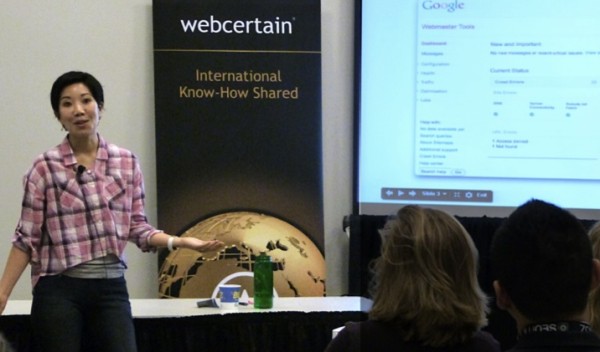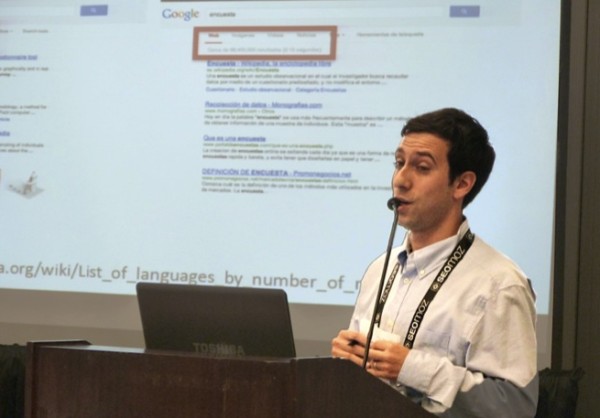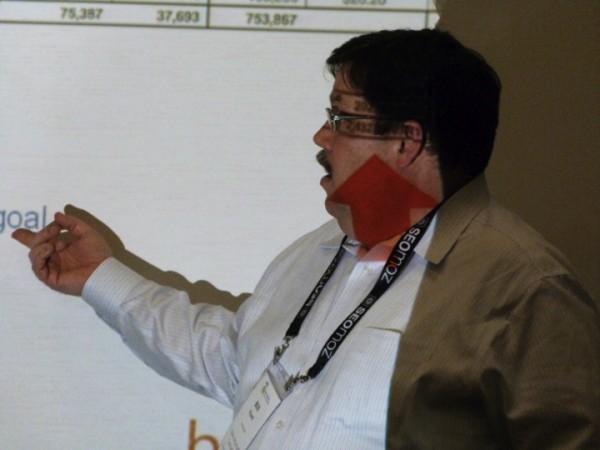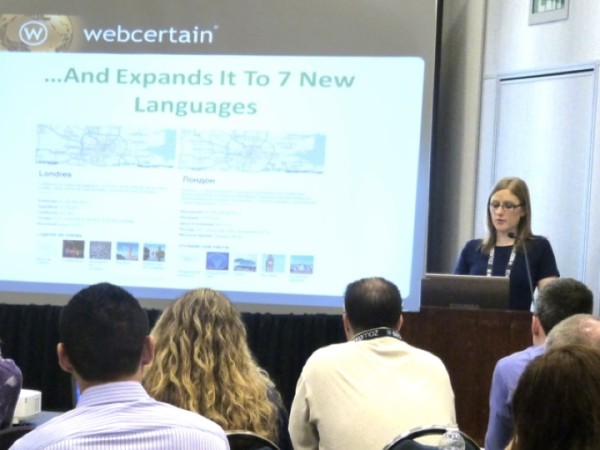Latest Tips From Google & Others At The International Search Summit @ SMX
Speakers at the International Search Summit, which took place alongside SMX West in San Jose last week, shared many useful tips on improving various aspects of international search from geo-targeting issues to targeting and handling different languages. Maile Ohye of Google spent over an hour speaking to delegates and answering detailed questions covering many of […]
Speakers at the International Search Summit, which took place alongside SMX West in San Jose last week, shared many useful tips on improving various aspects of international search from geo-targeting issues to targeting and handling different languages.
Maile Ohye of Google spent over an hour speaking to delegates and answering detailed questions covering many of the issues international marketers face. She covered the geo-targeting challenges faced by organisations and discussed how the still relatively new Hreflang tag, as well as Webmaster Tools, can be used to help Google make the right decisions on location.

Maile Ohye Of Google At The International Search Summit Source:Webcertain
Maile Ohye of Google spent over an hour speaking to delegates and answering detailed questions covering many of the issues international marketers face. She covered the geo-targeting challenges faced by organisations and discussed how the still relatively new Hreflang tag as well as Webmaster Tools, can be used to help Google make the right decisions on location.
Beginning by highlighting that international sites present complex issues for search engines, and the Google team itself had experienced the challenges through its own multi-language webmaster and marketer support sites, she stressed that the key issue is having the right page appear in front of its target users at the moment when they search.
Things that get in the way of Google figuring out how a website should be positioned include obstacles such as unnecessary 301 redirect chains, soft 404s (pages not found but which display a 200 instead of a 404) and non-useful language parameters.
Display Relevant Local URLs
Search engine users often examine the URL displayed in the SERPs, and it’s important for that to display a meaningful ‘local’ URL whenever possible. But, that requires a URL and website structure which delivers the right geographic information to the search engines.
Maile also asked international marketers to do some self reflection, “Is your team committed to developing an experience tailored to users of a different region or language as well as supporting those customers?” She also pointed out that successful rankings in one country do not automatically lead to similar rankings in a new one.
International sites take many forms. For instance, there are sites which rely extensively on UGC content which is written mostly in one or a small number of languages, but the site has auto-translated templates. Other sites feature virtually the same content in different regions using the same language — such as sites for South America, for instance.
The differences may be relatively minor — sometimes just the price and the currency. Or, there are the international sites which most think of where all content is given in local translations and many variations in-between.
Hreflang Consolidates Indexing Signals
Maile pointed out that the use of rel=”alternate” hreflang tagging in order to help Google “consolidate various indexing signals” can help a lot. It can be deployed on-page in the HTTP header, or in XML Sitemaps. A secondary benefit of using Hreflang is that Google will use it, almost as a link for discovery purposes only.
If you’re able to verify ownership of your sites in Google Webmaster Tools, then you can create just one sitemap that lists every URL with the corresponding rel=”alternate” hreflang.
If you have these three pages that correspond:
- www.example.com/fr/page.html
- www.example.mx/page.html
- sp.example.com/page.html
If you verify ownership of:
- www.example.com
- www.example.mx
- sp.example.com
You can submit one sitemap, but that sitemap must contain the grouping:
- www.example.com/fr/page.html
- www.example.mx/page.html
- sp.example.com/page.html
in the sitemap three times (once for each URL).
Maile stressed the importance of making sure that ALL alternates are tagged and, as demonstrated above, they can be on the same or different domains.
Take Care Not To Limit Visibility Outside A Region
It is also still possible to use the geo-targeting feature in Webmaster Tools using verified sub-domains or sub-directories — but care should be taken not to use this setting for a generic language, as it will “limit the searcher findability outside the region.”
When using fully regional tags such as en-gb and en-us, for two versions of English, for English searches outside those regions, Google will act as if the hreflang tags do not exist — but the possibility exists that you could target a version of English globally by using just “en.”
Best Practices For International Sites
Maile also covered other best practices for international sites including:
- Each URL should be capable of being shared and should not be redirected because of user IP or language preference. In addition to helping the user, this also avoids sending Google’s mainly US crawlers into the mist.
- For translated URLs, it’s best to adopt UTF8 encoding and stick to it. If you’re using “safe” URLs, namely URLs without diacritics because of a content management problem, Google will do its best to figure out the original intention.
- Make sure your site architecture is capable of scaling to a larger number of users across longer distances as speed of content delivery is critical.

Eli Schwartz Of Survey Monkey At The International Search Summit Source:Webcertain
Eli Schartz of Survey Monkey spoke particularly to methods which can be used by non-speakers of a language to undertake their own keyword research — including using Google Translate, Trends or Google Suggest, but ultimately checking the search terms with a native. He pointed out that this was only realistically possible in languages using Latin characters.

Bill Hunt of Back Azimuth Speaking At The International Search Summit Source:Webcertain
Bill Hunt discussed methods of getting management on board by demonstrating “missed opportunities” in keywords and then by demonstrating the potential value lost by not succeeding with those keywords. That value, when calculated by the value of demand lost, could amount to millions.

Preston Carey Of Yandex Speaking At The International Search Summit Source:Webcertain
Preston Carey described the current status of Yandex in Russia highlighting its continued resistance to the Google presence in Russia, and despite an intense “distribution battle — it’s all about the distribution.” He also intriguingly referred to Yandex’s intentions to expand internationally beyond its current Russian, Ukrainian, Belorusian, Kazakhstani and Turkish borders.

Mel Carson Of Majestic SEO Speaking At The International Search Summit Source:Webcertain
Data mining was the central message from Mel Carson who extracted geographic linking patterns from Majestic SEO’s database with those from social media sources such as Twitter. “If the interest on Twitter doesn’t match with your link profile, that would indicate a potential source of new links and a potential business opportunity,” he said.

Gemma Birch Of Webcertain Speaking At The International Search Summit Source:Webcertain
Gemma Birch of Webcertain relayed the latest “search engine headlines,” the latest news from Google, Yandex and Baidu in the international arena. One key observation was that whilst Baidu is holding its own in China, the competition is definitely getting hotter with the launches of new search engines and new potentially threatening alliances.

Andy Atkins-Krueger Compared Search Engine Settings At The International Search Summit Source:Webcertain
As well as discussing the Webcertain Geo-Targeting grid, I highlighted the differences between the systems of the international search engines comparing match types and settings, noting that they are almost all different and inconsistent, often caused by local language requirements.

Christina Zila Of Textbroker Speaking At The International Search Summit Source:Webcertain
The quality of content featured centrally in the presentation from Christina Zila from Textbroker, as she described the briefing process needed to generate good quality content and the number of times it needed quality reviewing. She also compared the quality of directly translated content with fresh and original content written by copywriters.
Contributing authors are invited to create content for Search Engine Land and are chosen for their expertise and contribution to the search community. Our contributors work under the oversight of the editorial staff and contributions are checked for quality and relevance to our readers. The opinions they express are their own.
Related stories